What Is Lay Betting?
If you’re just starting to become familiar with the world of Matched Betting, you might have heard about ‘lay betting’ without fully understanding how it works.
You might understand that it means to bet against something, rather than to bet for it, but why is it different to any other kind of bet? Why do you have to place a lay bet on an exchange rather than a regular betting site? And why is it so crucial to Matched Betting in the first place?
In this article, we’ll answer all those questions - and every other question you could think of - so by the time you finish reading, you’ll know all there is to know about lay betting, whether you’re a matched bettor or not.
What Is A Lay Bet?
A lay bet is a bet that something will not happen, in contrast to a back bet, which is a bet that something will happen. You could think of it as the opposite of a regular back bet.
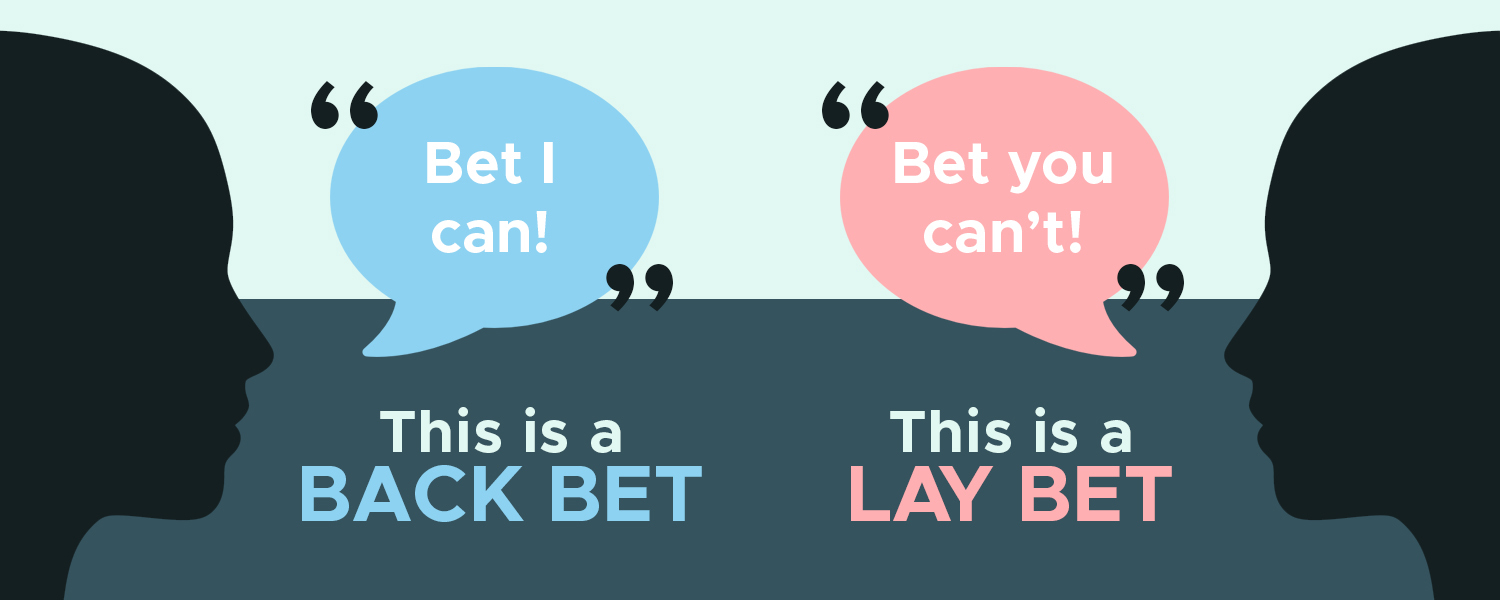
For example, in an upcoming match between Manchester United and Chelsea, your friend might say, ‘I bet you £10 that Chelsea win.’ If you take their bet, you have effectively placed a lay bet. Any outcome other than a win for Chelsea - i.e. a win for Manchester United or a draw - would result in your winning your lay bet. Laying a bet therefore allows you to cover all outcomes other than a win (in contrast to placing a back bet on a team’s opponents, which wouldn’t allow for a draw).
Lay betting in Matched Betting works the same way, just on a bigger scale. You’re acting as a bookie yourself when you place a lay bet, in that you are selling a bet to other punters. If their bet doesn’t win, you keep the stake as profit; if it does, you have to pay out their winnings (but don’t worry - if you’re Matched Betting, your winnings from your back bet will balance this out).
Where Can You Place A Lay Bet?
Lay bets cannot be placed on regular betting sites. To lay a bet, you have to go to an exchange. These work very differently to bookies, and allow the public to bet against each other, making their money by taking a commission on winning bets.
An exchange matches bets between customers who want to buy a back bet, and those who want to sell a lay bet. The odds offered are therefore based on the odds other customers are willing to accept - but they’re usually pretty close to the odds offered by a bookie, so long as an event is popular enough to attract a good amount of interest from bettors.
There are five major betting exchanges in the UK, all of which are available on our Oddsmatcher:
- Matchbook. A great exchange for beginners where you can claim 0% commission as an Outplayed member.
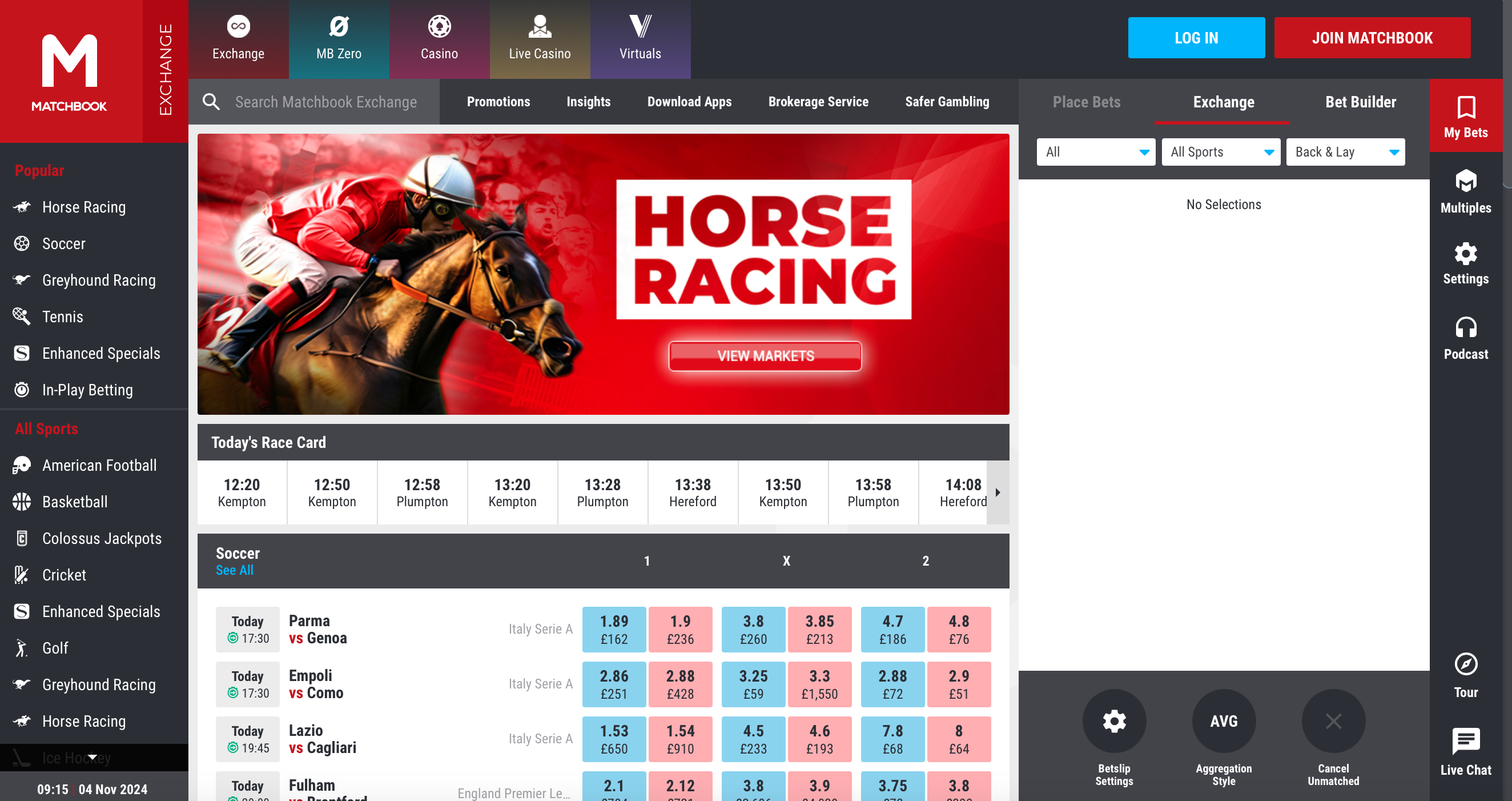
- Smarkets. Another great option with 0% commission for Outplayed members. Smarkets are particularly handy for their acca laying feature, which allows you to create custom accumulator lay markets in order to take advantage of acca offers through Matched Betting.
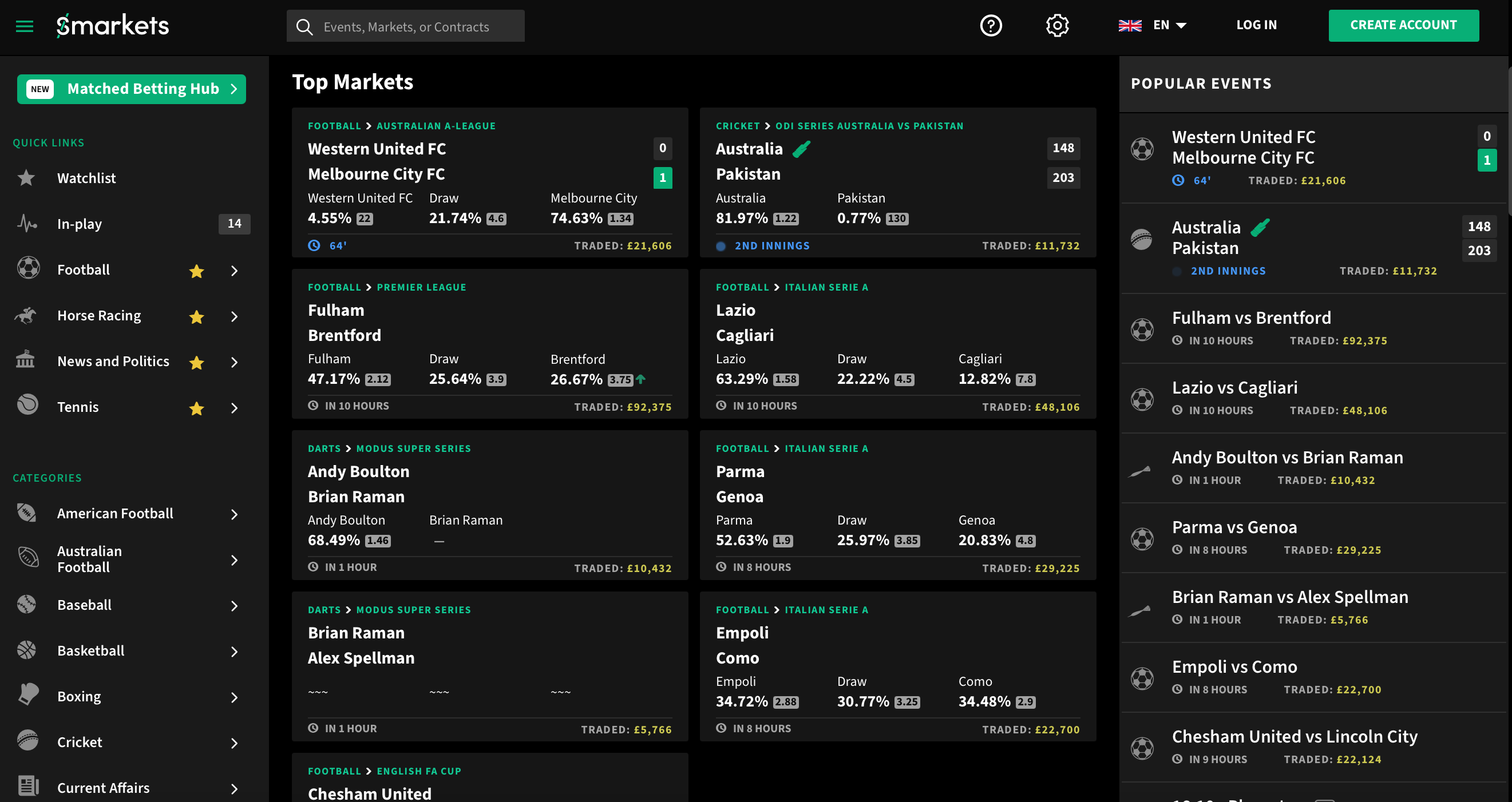
- BetConnect. Another great exchange that allows you to claim 0% commission when you link your Outplayed account. BetConnect offers exceptionally good odds on horse racing especially, allowing you to use tools like Outplayed's BOG Catcher (available with Diamond membership) to make profits from Matched Betting with the potential for £0 qualifying losses.
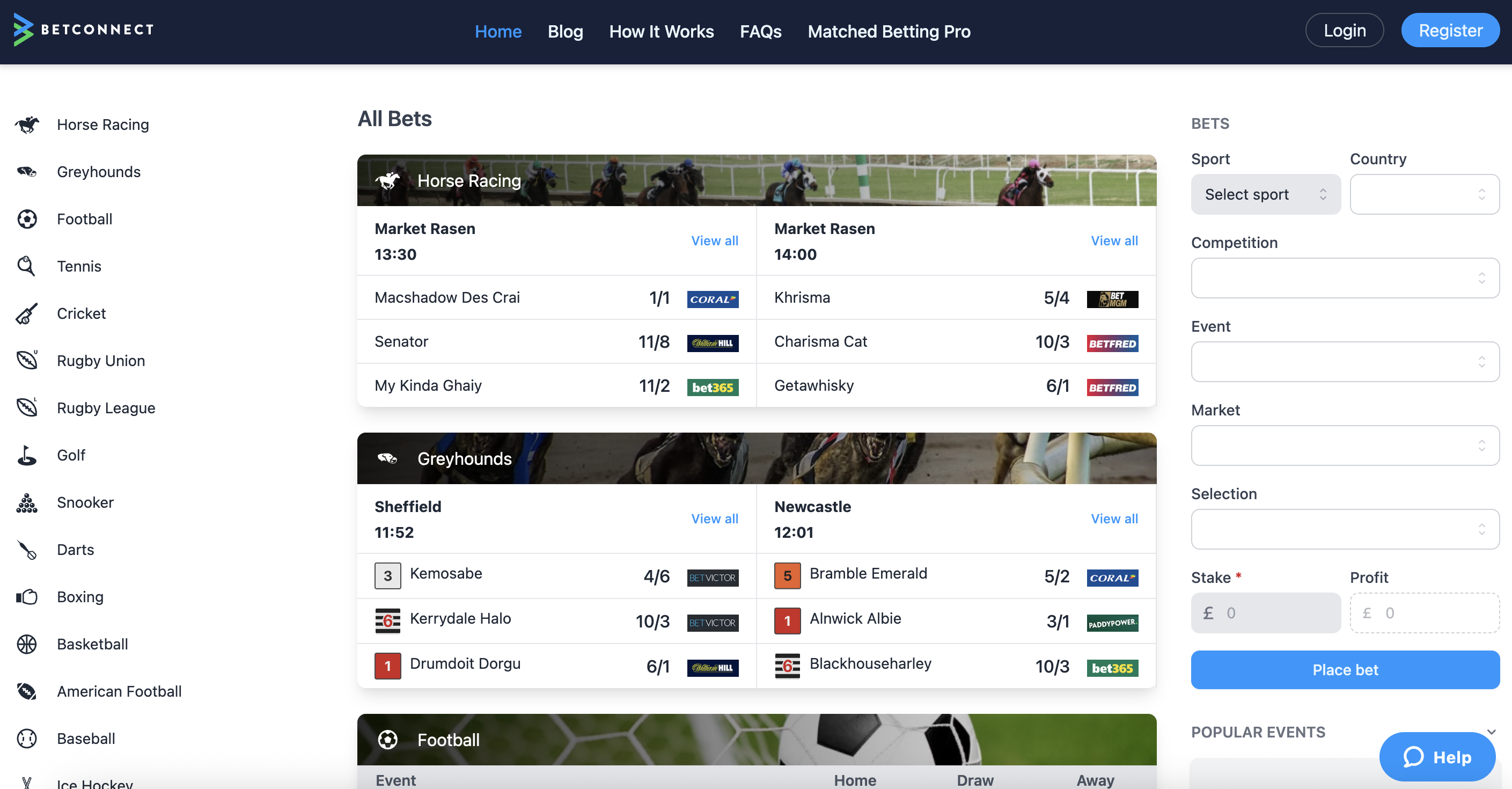
- Betfair Exchange. Betfair is the biggest exchange site out there, and also has its own sportsbook. You can choose between several packages, which offer varying commission rates. We recommend the ‘Rewards’ package, which offers a 5% commission rate - higher than some others - but gives you access to additional promotions, and a free bet each month if you place enough bets on the exchange.
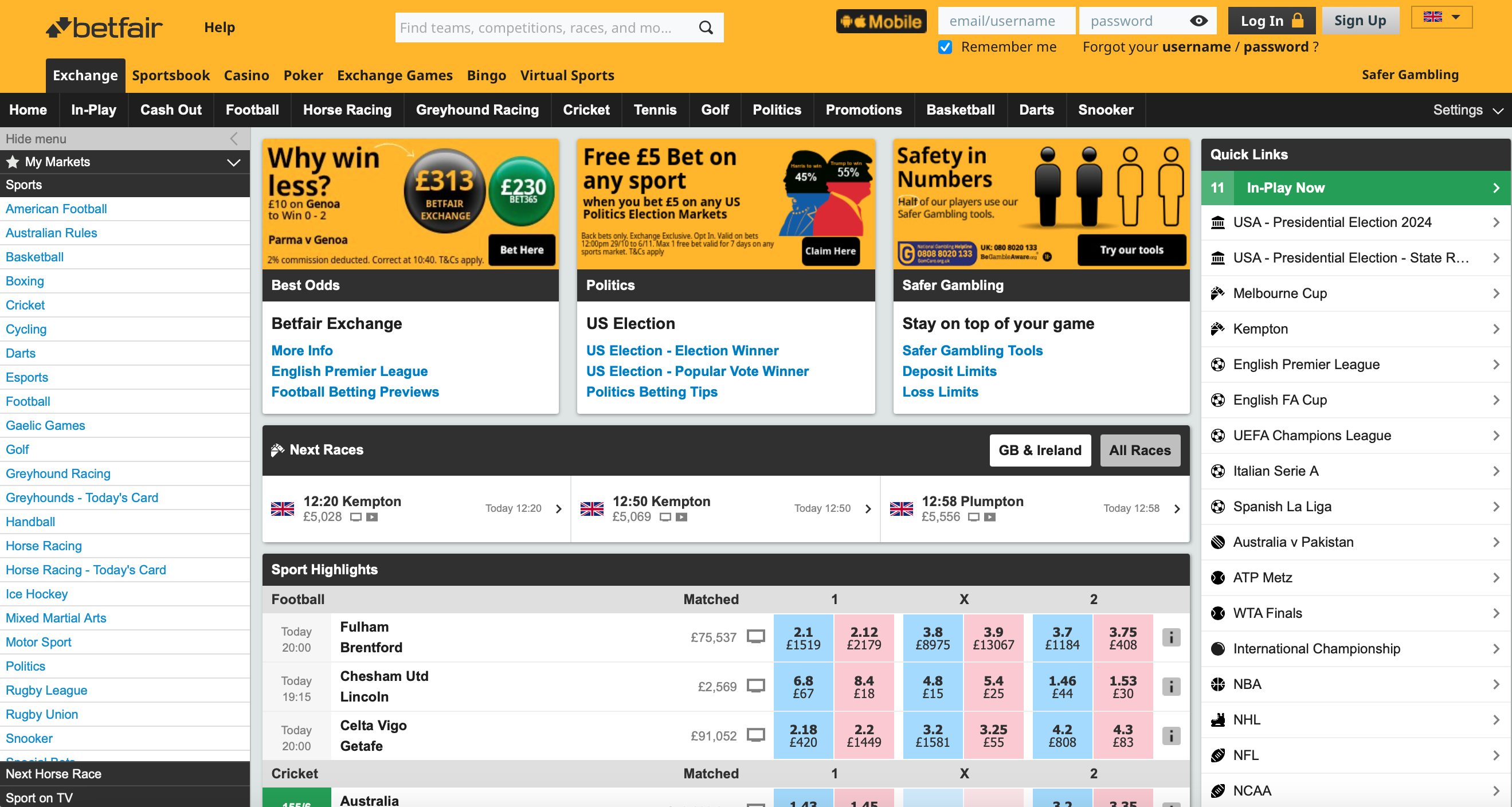
- Betdaq. Another great option, but smaller than Betfair, meaning that it may be harder to find good odds due to a smaller number of bettors placing bets. Their commission rate is 2% and they offer a 0% commission period, of 100 days.
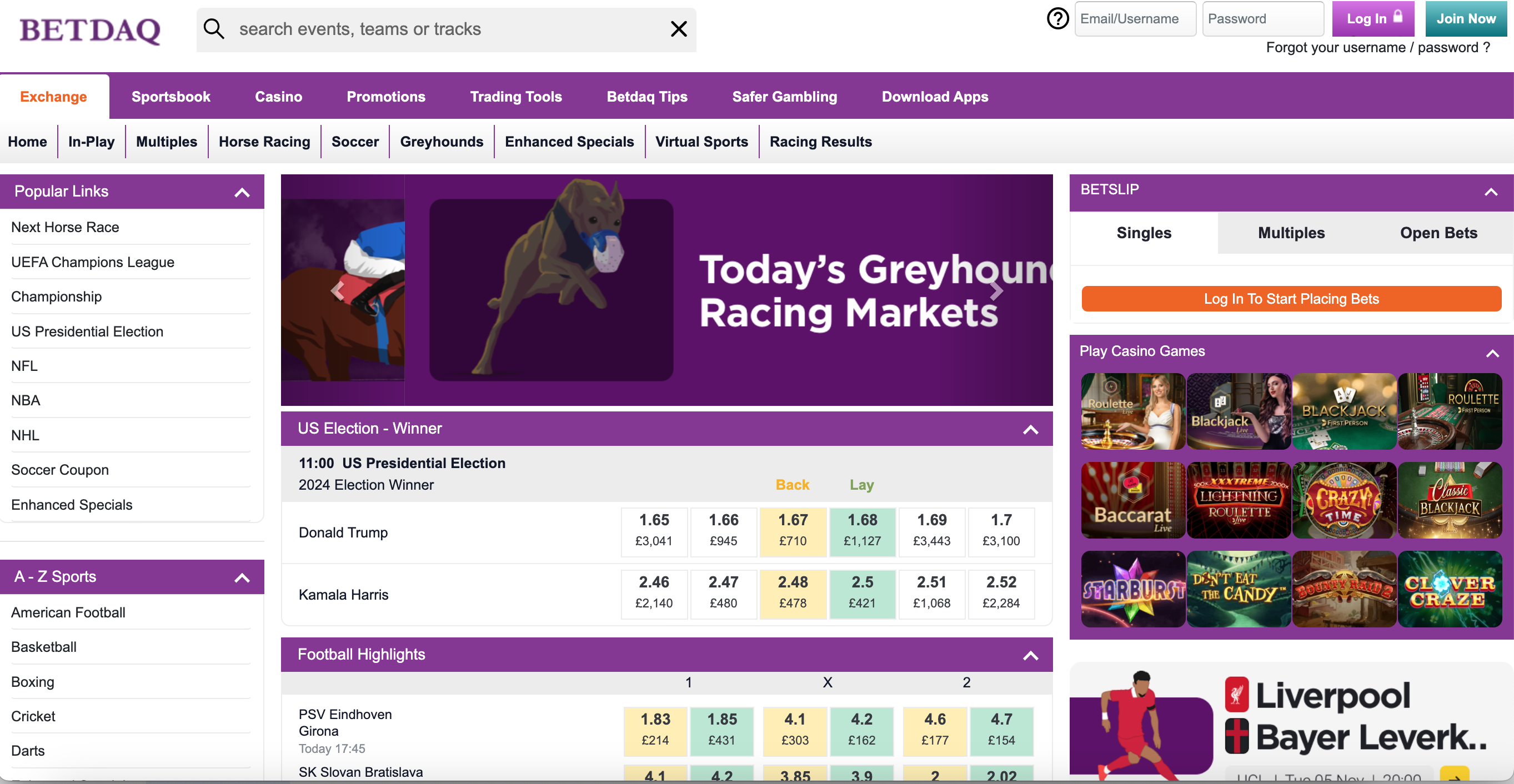
How Is A Lay Bet Different From A Back Bet?
Liability
Many newcomers to Matched Betting assume that a lay bet works exactly the same way as a back bet, only against an outcome instead of for it. However, that isn’t at all the case. Because you’re effectively acting as the bookie, you’re responsible for paying out winnings to ‘your’ customer if their bet wins.
The amount you have to pay is known as your ‘liability’. You don’t lose your original stake if your lay bet loses, but you do lose the amount you are liable for, which can be quite high, depending on the odds. Let’s have a look at an example to illustrate this.
For an upcoming match between Fulham and Crystal Palace, you decide to place a lay bet of £10 against a draw. The lay odds available are 3.5.
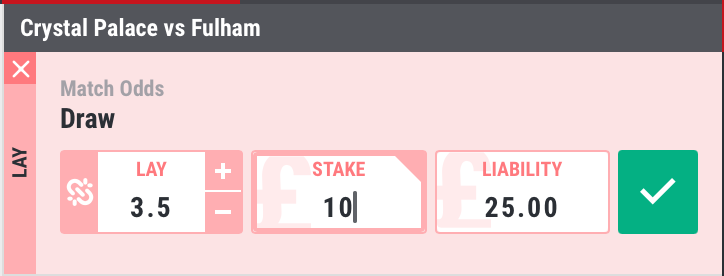
Your liability for this bet is £25, meaning that you will lose £25 (but not your original stake) if the outcome of the match is a draw. You therefore need to ensure you have at least £25 available in your account balance in the exchange when you place your lay bet.
The only exception to this is if you place lay bets against multiple outcomes at one exchange. For example, if you placed the above lay bet against a draw, and then also placed a lay bet against Crystal Palace winning. As it isn’t possible for both these outcomes to occur, you can’t possibly lose both bets - so the exchange will take this into account when calculating your liability.
Liquidity
Liquidity is the amount of money that can be placed on a lay bet at any particular odds, and it’s usually shown below the odds on the exchange website, as you can see below.

So long as the liquidity shown is higher than the lay stake you want to place, your lay bet will be immediately matched as soon as you place it. As you can see, there are several sets of odds available for each selection - back odds in blue, lay odds in red.
The best odds are shown in darker blue and red, but you also have the option of choosing slightly less advantageous odds if there isn’t enough liquidity for the amount you want to stake. So for example, you might want to lay £10 on a draw - but as there’s only £4 liquidity at odds of 3.6, you could choose to lay at 3.65 instead.
If there isn’t enough liquidity at your preferred odds and you attempt to place your bet regardless, you’ll have an unmatched or partially matched bet. If this is the case, you can choose to wait to see if more liquidity at your preferred odds becomes available - or alternatively, you can cancel the unmatched portion of your bet and try again (using the Fixabet calculator if need be) at the currently available odds.
Commission
We’ve already touched on the concept of commission, but it’s worth reiterating that you’ll usually be charged a percentage of your profits at an exchange, whether on back or lay bets, and it’s important to take this into account when Matched Betting.
Fortunately, our Matched Betting calculator allows you to enter your commission rate at the exchange, meaning that this will be automatically included in the profit figures you see when working out a matched bet using our tools. You can also enter your commission rates for each exchange in your account settings, so that these will always default to the correct rates.
Finally, don’t forget that Outplayed members enjoy 0% commission when using Matchbook, Smarkets and BetConnect, making for even more profitable Matched Betting.
How Can You Take Advantage Of Lay Betting?
The most obvious way to take advantage of lay betting is through Matched Betting. This is a technique that harnesses bookie offers, allowing you to place a qualifying back bet and lay it for a loss of only a few pence, and then use your free bet reward to make a guaranteed profit - so long as you do it right.
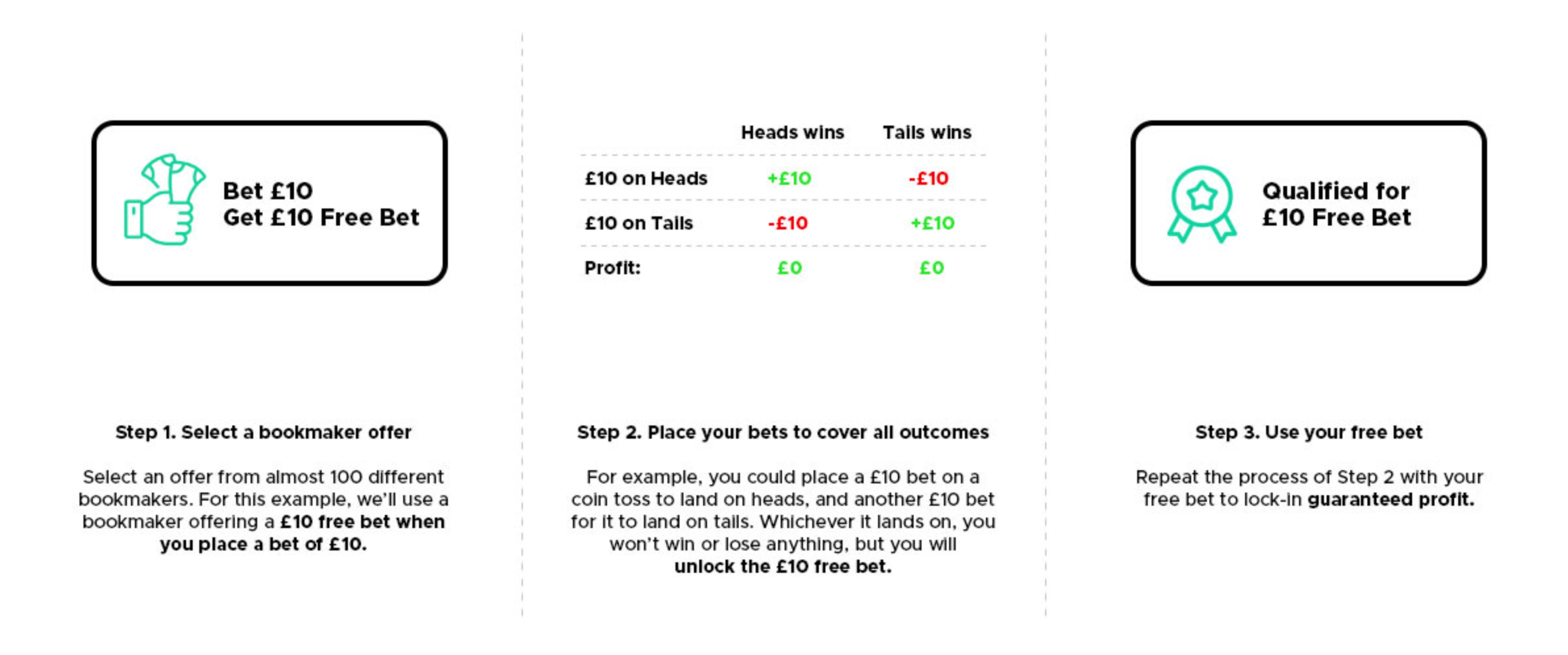
There are lots of different types of bookie offers out there, including price boosts, racing refunds, extra place offers and 2UP offers, and most of these can be used to profit through Matched Betting. To find out more, check out our complete Matched Betting guide for beginners, or alternatively sign up for our free trial to get going right away.
Underlaying And Overlaying
As standard, our Matched Betting calculator will work out the right amount to lay to produce equal profit regardless of the outcome of an event.
However, in some circumstances you might want to lay a custom amount, to make a higher profit for one outcome or the other.
For example, if you’re placing a free bet, and will receive a further free bet if it wins (for example if completing the Betfair Exchange Free Bet Streak offer), you might consider overlaying, to boost your profit if the exchange bet wins, as you know you’ll have the chance to make additional profit from a further free bet if your bookie bet wins. You can use our advanced calculator to work out your profits in either case with the custom lay tool, as shown in the example below.
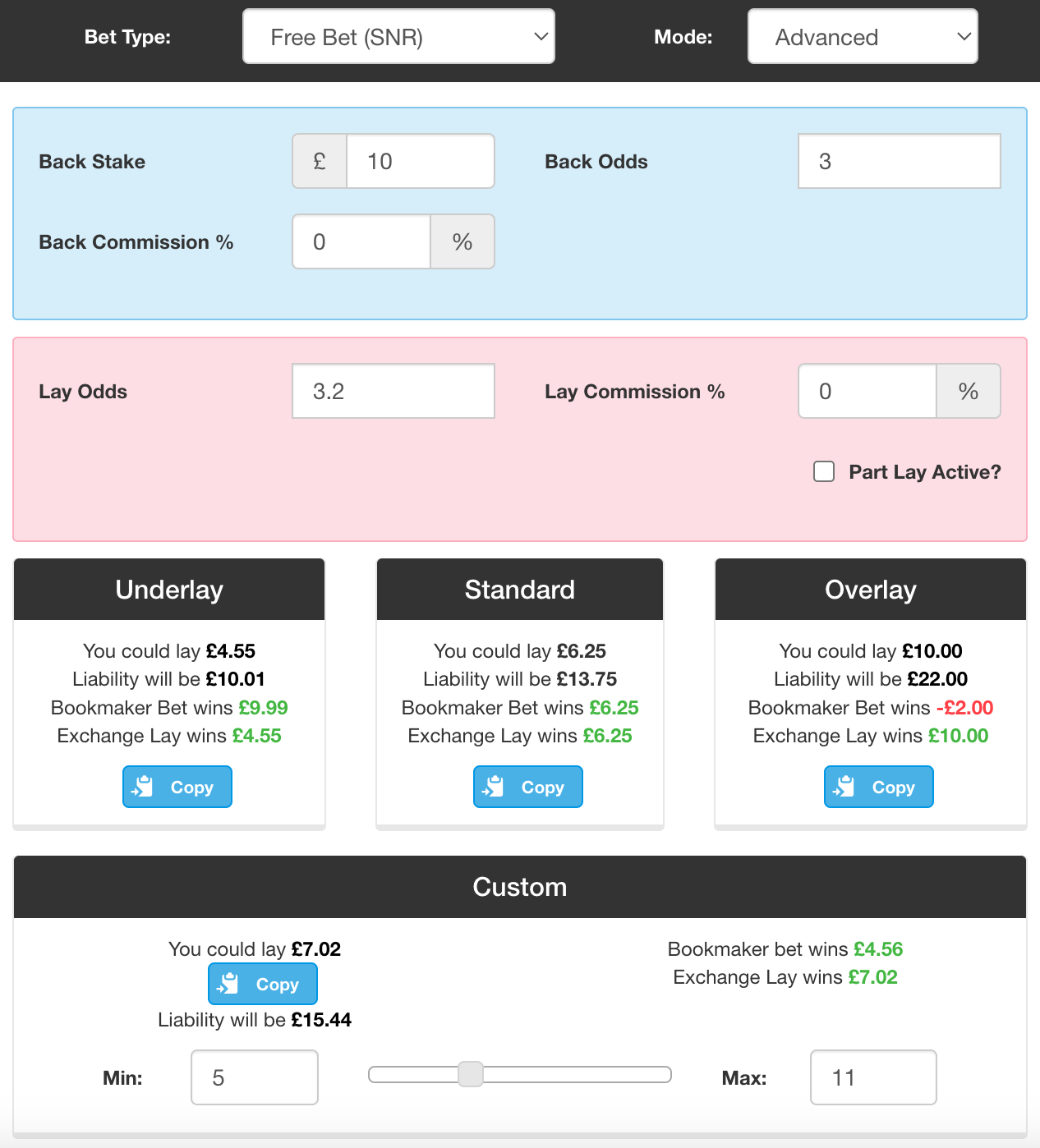
You might alternatively wish to underlay your bet in some situations - for example, if you receive a bonus if your qualifying bet loses (you can use the bonus lock-in calculator to work out the optimal amount to lay here).
It can also be useful to underlay a bet if you’re completing a sports offer that requires wagering a certain amount of money before you can withdraw a bonus.
If the bet wins at the bookie end, and you have to continue wagering, by underlaying you’ll have avoided reducing your bonus with that bet.
If it wins at the exchange end, you’ll have lost a little more - but the wagering is now complete, so you get to keep the entire remainder of the bonus.
Summary
Lay bets are instrumental in allowing us to make our profits from Matched Betting, so it’s important to understand how they work. Using a betting exchange, you’re able to bet against an outcome of an event, allowing you to lock in guaranteed profits from free bets - so long as you follow our instructions correctly.
When placing a lay bet, make sure there’s enough liquidity available for the stake you want to place, and that you’ve got a high enough balance in your exchange account to cover your liability - and don’t forget to take into account commission!
Even if you’re brand new to Matched Betting, it won’t be long before you’re lay betting like a pro.
Updated: 17 Feb 2026
The Author
Stephanie is a published author and, having taken up Matched Betting fairly recently, she knows exactly how beginners feel when they first start Matched Betting. She loves breaking down complex subjects in straightforward terms to make them accessible to newcomers, and to speed them on their way to making their first profits.

